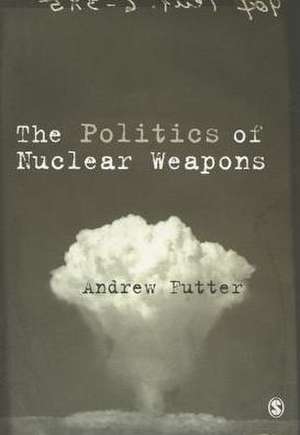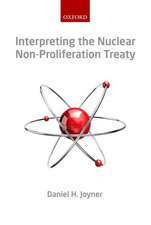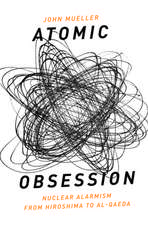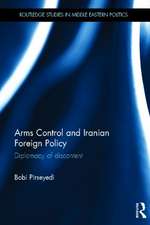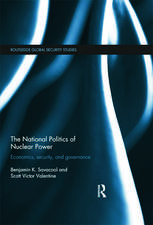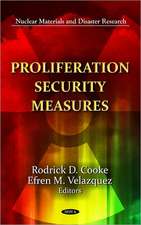The Politics of Nuclear Weapons
Autor Andrew Futteren Limba Engleză Paperback – 17 feb 2015
It includes:
- Coverage of nuclear testing, proliferation, strategy, global actors and disarmament.
- Analysis of contemporary topics such as nuclear terrorism.
- A timeline of key nuclear events.
- Annotated further reading lists helping you to locate sources for essays and assignments.
- Summaries, study questions and a glossary of key terms
- Free SAGE journal articles available on the Resources tab
The Politics of Nuclear Weapons is essential reading for both undergraduate and postgraduate students taking courses in Nuclear Politics.
| Toate formatele și edițiile | Preț | Express |
|---|---|---|
| Paperback (2) | 358.20 lei 6-8 săpt. | |
| Springer International Publishing – 24 noi 2020 | 358.20 lei 6-8 săpt. | |
| SAGE Publications – 17 feb 2015 | 460.62 lei 6-8 săpt. |
Preț: 460.62 lei
Nou
Puncte Express: 691
Preț estimativ în valută:
88.15€ • 91.79$ • 74.50£
88.15€ • 91.79$ • 74.50£
Carte tipărită la comandă
Livrare economică 10-24 martie
Preluare comenzi: 021 569.72.76
Specificații
ISBN-13: 9781446294314
ISBN-10: 1446294315
Pagini: 280
Dimensiuni: 170 x 242 x 15 mm
Greutate: 0.47 kg
Ediția:annotated ed.
Editura: SAGE Publications
Colecția Sage Publications Ltd
Locul publicării:London, United Kingdom
ISBN-10: 1446294315
Pagini: 280
Dimensiuni: 170 x 242 x 15 mm
Greutate: 0.47 kg
Ediția:annotated ed.
Editura: SAGE Publications
Colecția Sage Publications Ltd
Locul publicării:London, United Kingdom
Recenzii
Andrew Futter has written a superb textbook on the politics of nuclear weapons, covering both technical and political matters with original insight, expert commentary and thorough organization that makes this an excellent choice for undergraduate and graduate courses in international relations, foreign policy and military strategy.
This timely book will provide students and academics alike with a valuable foundation for understanding nuclear weapons related issues in both historical and contemporary contexts. Andrew Futter guides the reader through the technologies, strategies and debates that have characterized the nuclear age from the Manhatten Project to present day concerns over the potential for nuclear terrorism and Iran's continued nuclearization.
The book offers a meaningful synthesis of a wide variety of facts and opinions on key issues concerning nuclear weapons. Succinctly yet accurately, Futter describes the early years of the development of nuclear weapons and nuclear strategies, discusses differences between vertical and horizontal proliferation, identifies the obstacles associated with managing nuclear proliferation and disarmament, and addresses the challenges related to the access of non-state actors to nuclear weapons.
This timely book will provide students and academics alike with a valuable foundation for understanding nuclear weapons related issues in both historical and contemporary contexts. Andrew Futter guides the reader through the technologies, strategies and debates that have characterized the nuclear age from the Manhatten Project to present day concerns over the potential for nuclear terrorism and Iran's continued nuclearization.
The book offers a meaningful synthesis of a wide variety of facts and opinions on key issues concerning nuclear weapons. Succinctly yet accurately, Futter describes the early years of the development of nuclear weapons and nuclear strategies, discusses differences between vertical and horizontal proliferation, identifies the obstacles associated with managing nuclear proliferation and disarmament, and addresses the challenges related to the access of non-state actors to nuclear weapons.
Cuprins
Introduction: the politics of nuclear weapons
Chapter 1: What are nuclear weapons?
Chapter 2: Testing, defining and delivering nuclear weapons
Chapter 3: Nuclear proliferation: why states do or don't build the bomb
Chapter 4: Nuclear strategy: understanding the MADness
Chapter 5: Vertical proliferation challenges: assessing Article VI of the NPT
Chapter 6: Horizontal proliferation challenges: the nuclear outliers
Chapter 7: Managing nuclear proliferation challenges: limiting, preventing and defending
Chapter 8: Nuclear weapons and new global actors
Chapter 9: Nuclear disarmament
Chapter 10: Enduring nuclear challenges
Conclusion: surviving our nuclear future
Chapter 1: What are nuclear weapons?
Chapter 2: Testing, defining and delivering nuclear weapons
Chapter 3: Nuclear proliferation: why states do or don't build the bomb
Chapter 4: Nuclear strategy: understanding the MADness
Chapter 5: Vertical proliferation challenges: assessing Article VI of the NPT
Chapter 6: Horizontal proliferation challenges: the nuclear outliers
Chapter 7: Managing nuclear proliferation challenges: limiting, preventing and defending
Chapter 8: Nuclear weapons and new global actors
Chapter 9: Nuclear disarmament
Chapter 10: Enduring nuclear challenges
Conclusion: surviving our nuclear future
Descriere
Looking at both political and strategic aspects of nuclear weaponry, this exciting new textbook outlines how thinking about nuclear weapons has developed, considers how nuclear threats can continue to be managed in the future, and is accompanied by a companion website which makes it easy for students to find reliable, authoritative further resources.
Notă biografică
Andrew Futter is Professor of International Politics at the University of Leicester, UK.
Textul de pe ultima copertă
This comprehensively updated second edition provides an introduction to the political, normative, technological and strategic aspects of nuclear weaponry. It offers an accessible overview of the concept of nuclear weapons, outlines how thinking about these weapons has developed and considers how nuclear threats can continue to be managed in the future. This book will help you to understand what nuclear weapons are, the science behind their creation and operation, why states build them in the first place, and whether it will be possible for the world to banish these weapons entirely. Essential reading for all students of International Relations, Security Studies and Military History.
Andrew Futter is Professor of International Politics at the University of Leicester, UK.
Caracteristici
Covers everything from basic science, historical developments, conceptual models, regional cases to future trajectories Analyses the politics of nuclear weapons in a clear and accessible style Offers a full timeline of nuclear events, annotated further reading lists for your assignments, summaries, and a glossary of key terms
